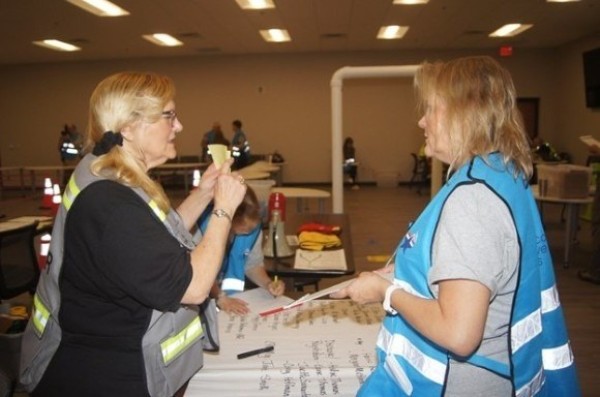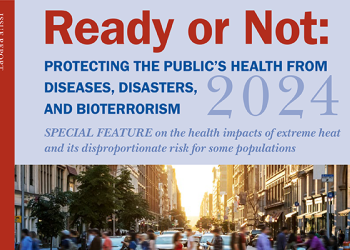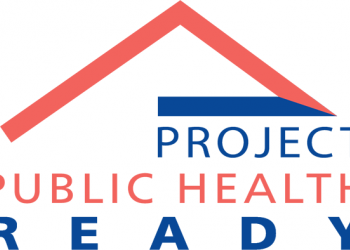Radiation emergencies can be intentional acts like terrorist attacks, or they can be accidents that occur when using radioactive material. A nuclear power plant accident, nuclear explosion, or a dirty bomb are examples of radiation emergencies.
The responsibilities of the public health agency in general are protecting the public’s health and safety as well as communicating health-related information to medical providers and the public. For radiation incidents public health professionals’ key responsibilities will include population monitoring, health surveillance and epidemiological investigations, distribution of medical resources, food and water safety, shelter operation, and providing protective key messages to the public.
One method of enhancing the limited resources of state and local response agencies is using the Medical Reserve Corps volunteers (MRC). MRC units can develop and train volunteer teams that could help at community reception centers, shelters, emergency operations centers, and hospitals.
MRC radiation volunteer teams can include technical, clinical volunteers like health physicists, medical physicists, radiation protection technologists, nuclear medicine technologists, and non-technical like public health professionals, and administration personal. In addition, MRC unit leaders can recruit and train volunteers to support mental health and psychological needs during radiation incidents.
To learn more about the different teams and trainings requirements for MRC volunteers to support a Community Reception Center, see the MRC Mission Set- Community Reception Center.
Virginia Medical Reserve Corps (MRC)
The Virginia Medical Reserve Corps (MRC) is a force of dedicated volunteers who stand ready to support the community in the event of a public health emergency. Each of the 25 local MRC units across Virginia are comprised of teams of medical and non medical professionals who volunteer their skills, expertise, and time to support ongoing public health initiatives and health emergencies throughout Virginia.
Only a few states had initiated efforts to mobilize MRC volunteers at the state level to assist in radiological incident response. Michael Magner the Virginia Sate MRC Coordinator stated that the idea behind creating a Radiation team of MRC volunteers at the state level came from the office of Radiological Health at the Virginia Department of Health (VDH) as they saw a gap in workforce.
The Virginia Office of Emergency Preparedness partner with the office of Radiological Health to recruit and train two specialized MRC volunteers’ teams. The first team is the Evacuation Assembly Center (EAC) or Community Reception (CRC)Team, this team will support and augment staff at local HDs when opening EACs and CRCs. This team will only be activated when localities request it.
Magner explained that the MRC units that have volunteers trained and ready to support EACs are few and you have these teams only within health districts that are within 10-mile radius of nuclear power stations. This team will help these localities and will also serve as a response team in localities that do not have specialized radiation teams. The second specialized team is Non-Plume Zone Monitoring Team (NPZ) a team that will augment the monitoring team at the office of Radiological Health at the state level.
Both teams were able to have their first trainings last month and should be ready to support, Magner indicated as next step will be to invite these volunteers to participate in radiation exercises.
“To keep our volunteers active post COVID-19, this is exactly what some of the things that I recommend to MRC unit leaders be like, hey, get them involved in other missions,” said Magner.
Watch the recorded video at TRAIN Course ID #1111440.
MRC GEM- Georgia
The Georgia East Metro Health District Medical Reserve Corps (MRC-GEM) is a nonprofit organization serving the health and emergency preparedness needs of Georgia’s Gwinnett, Newton, and Rockdale counties in Georgia. They work closely with three local health departments, emergency managers, and homeland security to augment and scale up their responses.
MRC GEM unit has 20 specialized radiation volunteers who have been trained and ready to be deployed to support any locality withing Georgia or through the Emergency Management Assistance Compact (EMAC) to support other neighboring states.
Sherwin Levinson the Executive Director and the MRC Unit leader of MRC-GEM explains that there are two types of foundation trainings that he recommends for the radiation volunteers to take. A course on radiation basics and a course on what is a CRC. Levinson explained that after the new volunteers finish all the required and recommended trainings, he will make sure to get them involve in radiation exercises with responders’ partners.
Levinson’s future vision is to train these 20 volunteers to become teams leads so they can come in, set up CRCs till other support/help arrive. Levinson advises other unit leaders who are looking to recruit and train volunteers to support radiation incidents is make sure to volunteers have the basics knowledge of radiation as that will help fight their fears.
“This is something that I think people get excited about. because there are, you know, discrete tasks to do. It’s the kind of thing that you can exercise easily, and once you get them past the idea that they have to be afraid of radiation, it’s like, you know. Now they’re part of a special club,” said Levinson.









